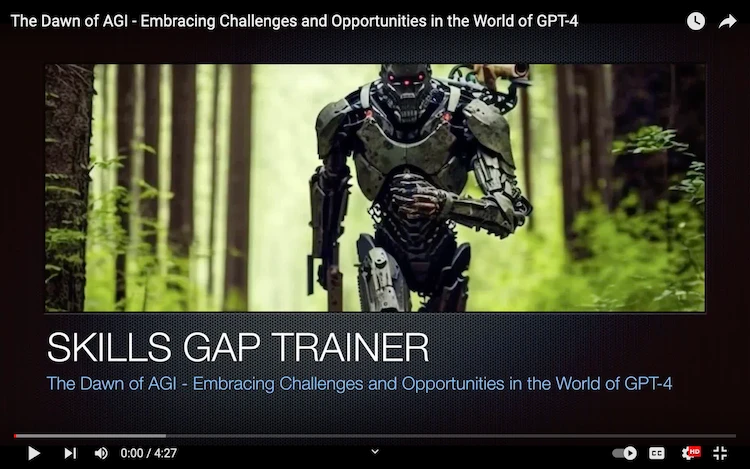As we stand at the brink of an epoch defined by the rapid evolution of Artificial General Intelligence (AGI), we find ourselves thrust into a revolution unlike any witnessed before. This transformative era, vividly portrayed in the discourse by Canadian Prepper, Nate, and within the pages of Hugo de Garis’s groundbreaking book “The Artilect War”, paints a compelling narrative about the trajectory of AGI technologies, particularly OpenAI’s GPT-4, and the profound societal shifts they may bring about.
AI researcher and visionary, Hugo de Garis, provides us with an extraordinary glimpse into the future, where the ascendance of ‘Artilects’ or ultra-intelligent machines could fundamentally alter the world. This anticipated societal upheaval may trigger a clash between those championing the progress of AGI, the ‘Cosmists’, and those safeguarding humanity, the ‘Terrans’.
In the labyrinth of AGI discourse, Nate brings to our attention the breakthroughs achieved by OpenAI’s ChatGPT-4. This language model, equipped with the ability to understand context, generate human-like responses, and learn from interactions, embodies the progress pushing us towards the Cosmist vision.
Yet, as with all revolutionary technologies, AGI brings its unique challenges. AGI stands out in the tech landscape as its commercial potential fuels relentless advancement. This market-driven progression raises a pressing question: how can we regulate a technology that is propelled by market forces into unceasing evolution?
As we ponder this future, we, as professionals in the skills gap training sector, bear a heavy responsibility. Our mission is to equip individuals for a world where AGI may not merely exist but could dominate our workforce. Our challenge is to empower learners to utilize this technology effectively while educating them on its ethical implications and potential societal impacts.
Nate’s discourse is a powerful rallying cry, urging us to move beyond the role of spectators and to actively shape the trajectory of AGI. As we navigate the complexities of the Artilect era, we must remember our obligation to ensure equitable access to the benefits AGI offers.
Our journey towards this new era necessitates deep reflection, collective discourse, and a commitment to construct a future that honors the importance of AGI. With guidance from voices like Nate, we must rise to the challenge of building a world where AGI serves humanity, fills skill gaps, and cultivates a more equitable and prosperous society.
The dawn of the Artilect era signifies a transformative moment in our collective story. Amidst the challenges that lie ahead, we are also presented with immense potential. As we take this crucial step, we must do so with understanding, preparedness, and a steadfast dedication to the responsible management of AGI.
This profound transition demands an active collective dialogue and deep introspection. Using resources like Nate’s discourse, we can stimulate this critical conversation. We’re not mere observers of this technological revolution but active participants. It is incumbent upon us to forge a future where AGI serves humanity, bridges skill gaps, and fosters a more equitable, prosperous world.
In conclusion, as we stand at the cusp of this new era, we face an extraordinary responsibility to balance the promises and perils it brings. Embracing the challenges and opportunities ahead, we must commit to shaping a future that recognizes the gravity of AGI and its far-reaching impact on our society. Let us prepare ourselves for the challenges that lie ahead, not with fear, but with hope, courage, and an unwavering resolve to shape a future that best serves humanity.
STOP BILL C-21 – Petition Details – Change.org
https://www.change.org/p/canadian-gov…
“Take Action! Send a letter or e-mail letter to a Senator in the The Senate of Canada Today!”
https://sencanada.ca/en/senators/
Related books and resources:
“Life 3.0: Being Human in the Age of Artificial Intelligence” by Max Tegmark: This book provides a profound exploration of the future of life on Earth and beyond, focusing on how AI will affect work, laws, society, and the very essence of human existence. It aligns well with discussions on AGI’s societal impacts.
“Superintelligence: Paths, Dangers, Strategies” by Nick Bostrom: Bostrom’s work offers a deep dive into the potential futures of AI development, including the risks and strategies for managing superintelligent systems, which complements discussions on AGI management and ethical implications.
“The Singularity Is Near: When Humans Transcend Biology” by Ray Kurzweil: Kurzweil’s optimistic view on the future of human and artificial intelligence offers a contrast to de Garis’s perspectives and enriches the debate surrounding AGI’s role in society.
“The Master Algorithm: How the Quest for the Ultimate Learning Machine Will Remake Our World” by Pedro Domingos: This book provides insight into the different schools of thought in machine learning, one of the foundations of AGI, and offers a broad perspective on how AGI could develop.
“Human Compatible: Artificial Intelligence and the Problem of Control” by Stuart Russell: Russell’s recent work addresses the challenges of aligning AI with human values and interests, a crucial aspect of responsibly managing AGI’s societal impacts.
“The Artilect War: Cosmists vs. Terrans: A Bitter Controversy Concerning Whether Humanity Should Build Godlike Massively Intelligent Machines” by Hugo de Garis: Directly mentioned in the post, this book delves into potential conflicts driven by AGI development, providing a background to the societal upheaval discussed.
“AI Superpowers: China, Silicon Valley, and the New World Order” by Kai-Fu Lee: This book explores the global dynamics of AI development, emphasizing the role of market forces and commercial potential, directly relevant to the post’s discussion on AGI progression driven by market forces.
“Weapons of Math Destruction: How Big Data Increases Inequality and Threatens Democracy” by Cathy O’Neil: While not directly about AGI, O’Neil’s critique of big data and algorithms complements discussions on ethical implications and equitable access to AGI technologies.
“Our Final Invention: Artificial Intelligence and the End of the Human Era” by James Barrat: This book explores the risks associated with unchecked AI development, aligning with the post’s concerns about responsibly managing AGI’s advancement.
“How to Create a Mind: The Secret of Human Thought Revealed” by Ray Kurzweil: This provides insights into how human-like cognitive structures could inform the development of AGI, relevant to discussions on GPT-4 and AI research aimed at understanding context and generating human-like responses.
To see our Donate Page, click https://skillsgaptrainer.com/donate
To see our Instagram Channel, click https://www.instagram.com/skillsgaptrainer/
To see some of our Udemy Courses, click SGT Udemy Page
To see our YouTube Channel, click https://www.youtube.com/@skillsgaptrainer

